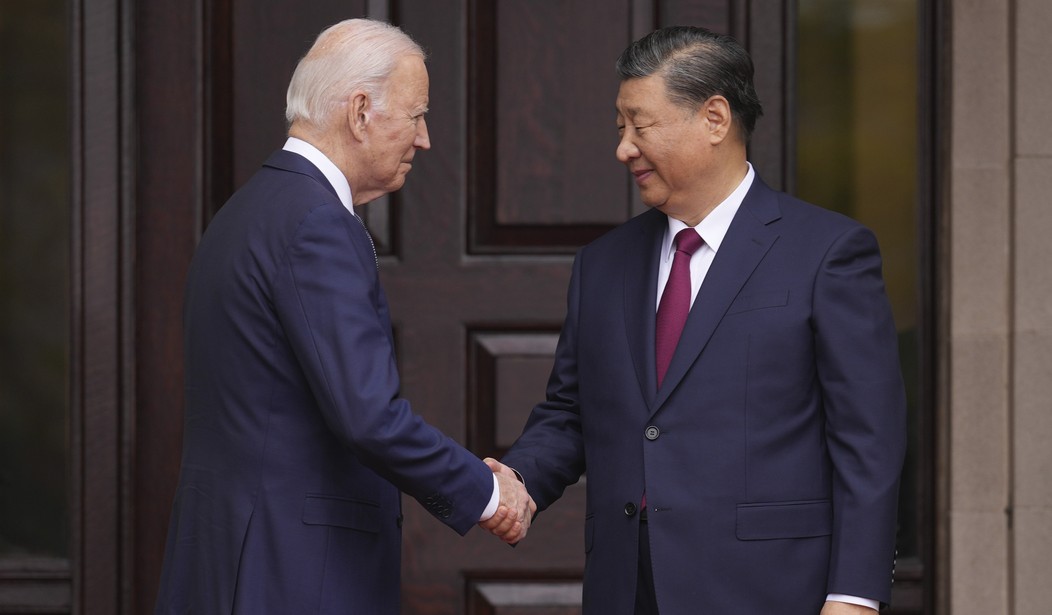The foreign policy establishment of the United States (and the Western world for that matter) has long been afraid that China is perpetually on the rise, to the point where we've taken actions meant to delay or stall their rise.
The Biden administration, with its less-than-stellar record on the foreign policy front, is attempting to straddle the line between being tougher on China and moving away from an American-centric world order. The problem is that the former comes from a misreading of China's position and the latter is just bad policy for global stability.
To be fair, the Biden team has been working on policies meant to stifle Chinese technological innovation, with a specific focus on computer chips. The CHIPS Act, a legislative policy pushed heavily by the Biden administration, is just one of the tools the U.S. has adopted. Overall, at times it has seemed like the administration has attempted to take the Chinese threat seriously.
READ MORE:
The Biden Administration May Just Be Getting Tough on China in 2023
Biden Administration Escalates Tech War With China, Targets Access to Cloud Computing
Most recently, the Biden administration has begun taking steps to sanction the Chinese for aiding Russia in its conflict against Ukraine.
Russia is still embroiled in a conflict against Ukraine as part of Vladimir Putin's strategy to expand Russia's influence via Soviet-era borders. The Chinese government has supported Russia in its efforts, and Chinese firms have been providing direct assistance to the Russian government. Both the Biden administration and Congress have considered policies to bring sanctions to these Chinese entities, CNBC is reporting.
The U.S. is considering slapping sanctions on Chinese companies it believes are helping Russia fuel its war in Ukraine, members of Congress told CNBC, marking the first direct apportioning of blame toward Beijing since the start of the war.
Democratic Senator Gerald Connolly, member of the U.S. House Committee on Foreign Relations, on Saturday said that lawmakers were already considering such plans after similar measures were proposed last week by the European Union.
The provisions would mark the first direct penalties against Beijing despite long-held Western suspicions over its support for Russia’s military operations.
If the U.S. and the EU stand their ground on this, then yes, it may mark a significant shift in policy toward China.
What is remarkable, however, is that we aren't doing more and sooner. China is considered to be on the ascent by the foreign policy establishment of the Western world, but a look at several key factors there indicates that they actually are on the decline instead. Take, for instance, this story from not too long ago, where Xi Jinping furiously had to purge his military. Corruption is on the rise in Communist China as contractors would fill Chinese missiles with water and pocket the gas money for themselves.
What's more, based on intelligence reports and analyses, the rapid modernization of the Chinese military may have done the same thing for the Chinese that it did for Russia - create a paper tiger.
U.S. think tanks and defense contractors believe that Xi aims to have a completely modernized military that is capable of taking on any global power by 2027. One such example is the rapid assembly of aircraft carriers and other naval vessels at a rate that far outpaces the U.S. Navy. But just because they can be rapidly assembled doesn't mean they're ready to go right away.
Consider also that the once powerhouse economy is now in the midst of a deflation crisis that is threatening real economic turmoil in the country.
Recent data show China experiencing its sharpest decline in consumer prices in over 14 years, while producer prices fell by 2.5 percent, dropping for the 16th month in a row. This situation indicates a significant risk of prolonged deflation in China, exacerbated by challenges like a real estate slump, stock market downturn, loss of investor confidence, weaker exports and low consumer demand. Despite expectations for a temporary price rebound in February due to Lunar New Year demand, China’s economic issues – excess supply, insufficient demand and financial strain – persist.
China has long been suspected of manipulating its currency and its economic data. We are fairly certain it was lying throughout the COVID-19 pandemic regarding those who were sick and dying, as well as the origin of the virus. Somewhat ironically, the amount of control Xi Jinping and his party have over China also makes it incredibly easy to point the finger when it comes to blame. They are in absolute control over everything, and therefore the country's misfortunes are squarely on them.
With the evidence that we have, it seems that we are witnessing a China that is less on the rise and more on the decline. Russia proved something similar in its war with Ukraine. This once-feared military is struggling against a smaller and less-equipped country. China may be stronger than Russia, but it's also quite possible that their ability to wage a protracted war may end up costing them more than the current foreign policy establishment thinks.
America is very likely on a collision course with China, but the outcome may not be as pre-determined as some folks believe.













Join the conversation as a VIP Member